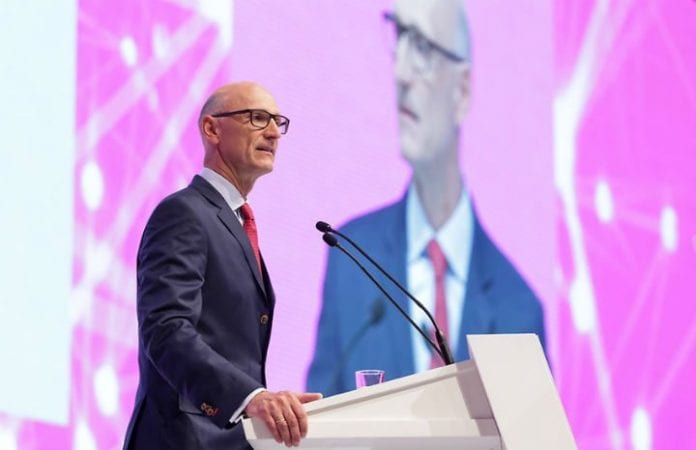Deutsche Telekom is to launch a data-sharing platform for industrial enterprises, in particular, that allows direct access to information between enterprises providing data, and those scheduled to receive it. The Germany-based telecoms group described it as a “key element for the digital factory,” ahead of Hannover Messe next week, where it will unveil a number of Industry 4.0 showcases.
The new Telekom Data Intelligence Hub (Telekom DIH), from Deutsche Telekom’s enterprise division T-Systems, will cut out the need for external or centralised data storage by encrypting data in direct transit, and giving owners full control of access rights.
T-Systems said it is the first company to implement new reference architecture drawn up in the International Data Spaces Association (IDSA), an initiative by the Fraunhofer Institute, backed by politicians, researchers and industry, to create virtual data spaces that support secure data sharing for both national and international businesses.
The Telekom DIH platform will also provide access IoT services and applications for processing and analysing data, including machine learning and artificial intelligence tools. “This means that, for the first time, a secure marketplace is available where data can be traded, and also processed and analysed as required,” the company said in a statement.
The service, which launched in the second half of 2018, is targeted at multiple industrial markets. Sharing will be eased between manufacturers and suppliers in planning, production and logistics, for example, it said.
Ingo Hofacker, senior vice president for IoT at Deutsche Telekom, commented: “It fulfills a key interface function between providers of data and solutions and users – something that has been missing in the field of data management till now. Telekom DIH provides a complete market overview of data that on the one hand are freely available, and on the other are offered for sale and purchase.”
Hannover showcase
T-Systems will showcase a bespoke version with Germany-based steel producer Salzgitter at Hannover Messe next week, where the industry expects movement at last on the road to industrial transformation. Salzgitter is using the hub to share data sets from a disparate range of sources about factors such as steel grades and delivery routes with a raw material supplier.
“The data comes from different systems and is largely incompatible. In the past, data like this had to be converted and adapted in a complicated procedure before the partner could process it in their systems,” explained Deutsche Telekom.
“Data can now be intelligently reconciled and shared between Salzgitter and its supplier in an automated process. This boosts the processing speed enormously and at the same time reduces the coordination effort for everyone involved in the data exchange.”
Quoting a study by consultancy PwC, Deutsche Telekom said three quarters of medium and large sized companies in Germany share data with customers and partners, and yet are concerned they will lose ownership and control of it, and risk business secrets as a result.
Lars Nagel, managing director of the IDSA, said: “It is absolutely vital for companies to protect their sensitive business information. It is therefore hugely important that the Telekom DIH enables them to decide for themselves under what conditions they allow partners access to their data.”
Orchestration station
Meanwhile, Deutsche Telekom said it has contributed a “substantial investment” in Israeli IoT start-up Axonize as part of a $6 million round-A funding. Axonize allows service providers to orchestrate, connect and manage multiple IoT applications, granting service providers management capabilities across all applications. The company has a unique architecture based on a pre-built, highly flexible application layer that resides on a Microsoft Azure cloud.
The $6 million round A was led by Israeli Venture Capital firm Meron Capital and included existing investors StageOne Ventures and US-based Cornerstone Venture Partners. Anette Bronder, head of Deutsche Telekom’s digital and security Department said: “Apart from our investment, we see great collaboration potential because Axonize ideally complements Deutsche Telekom Group’s IoT platform ecosystem worldwide.”
As well as its IoT orchestration capabilities, Deutsche Telekom is also using the Hannover fair to showcase its IoT Service Button, a smart retrofit IoT solution for logistics, manufacturing facilities, workshops, construction sites, and hospitals. Its button can be programmed for any industry and company specific functions, whether ordering spare parts, reporting malfunctions or scheduling collections.
Bavarian manufacturer Krones, which sells packaging for food and beverages industry, has equipped 28 collection points with the IoT Service Button, allowing staff to easily request spare parts. Hofacker described the gadget as a “practical solution” for automating manual processes on production lines, construction sites and automobile workshops. “This avoids unnecessary running around and additional manual processes,” he said.
On the same stand, T-Systems is showing its new product lifecycle management (PLM) cloud solution, which launched at the start of the year. Its PLM Cloud promises to bring manufacturing development processes, from initial design through to test simulation, into the digital age, said Deutsche Telekom.
“PLM Cloud offers businesses the option of using their own software licenses or the software of tried-and-tested PLM specialists, already integrated into the platform. That means customers don’t have to tie themselves down to one vendor, and can instead opt for the solution that best fits their processes,” it said.

